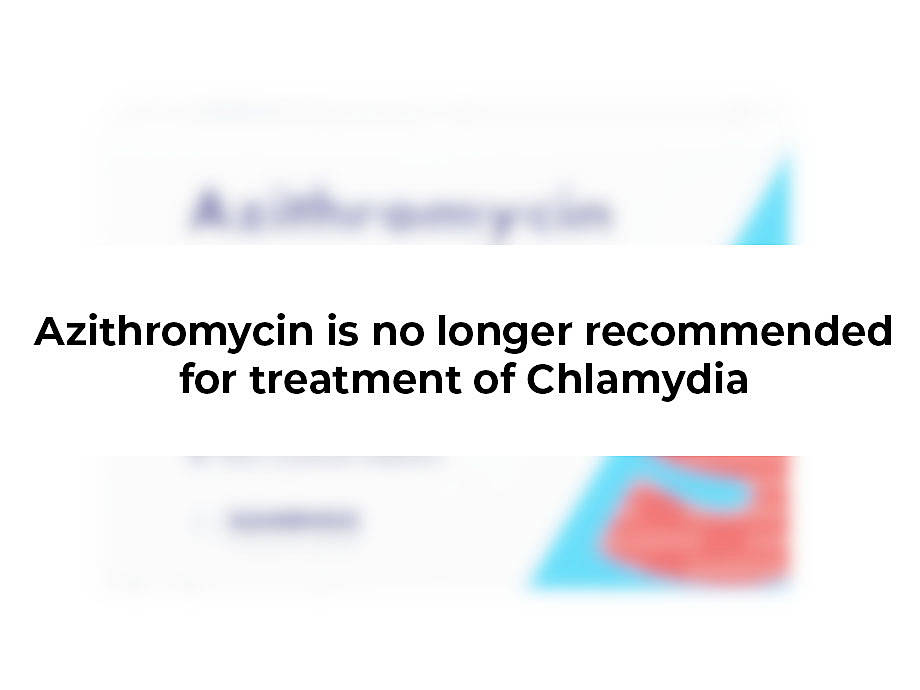Azithromycin
Order Consultation for Chlamydia Treatment


Azithromycin is the most commonly prescribed antibiotic for treating chlamydia in Ireland.
To place a prescription order for chlamydia treatment, fill in our brief questionnaire. You can choose a preferred treatment, such as Azithromycin.
One of our doctors will check if the medication is suitable for you and issue your prescription to a local pharmacy in Ireland or your home address. Alternatively, you can choose to have your medication delivered directly to your door.
A consultation for chlamydia treatment prescription costs €21.50.



About Azithromycin
What is azithromycin?
Azithromycin is an antibiotic from the “macrolides” group.
What does azithromycin do?
Azithromycin destroys the bacteria responsible for causing chlamydia, by preventing them from producing the proteins they need to survive.
In addition, azithromycin is used to treat other bacterial infections such as chest, throat and nose infections (bronchitis, tonsillitis and pneumonia), ear infections and skin or soft tissue infections.
How effective is azithromycin at treating chlamydia?
Since azithromycin destroys the bacteria responsible for causing chlamydia, it is highly effective. Most studies show azithromycin to be over 95% effective at treating chlamydia. However, this is only if you take the medication correctly and avoid having further unprotected sex whilst on treatment. Other factors may affect how effective the treatment is. You can find more information about these factors in the patient information leaflet that comes with your medicine.
How do I know if I have chlamydia?
Chlamydia is largely symptomless which is why it is one of the most common STIs. Around 50% of men and 70% of women do not experience any symptoms. The most common symptoms of chlamydia, such as discharge from the penis, vagina or anus, pain while urinating, and bleeding in between periods in women, can easily be neglected. Therefore, it is really important to get checked for chlamydia after unprotected sex, particularly if you have several partners or are with a new partner.
Can I still have intercourse while I am on treatment?
Ideally, you should wait until your chlamydia has cleared before having sex, to avoid exposing your partner to any risk. However, if you do wish to have intercourse while you are undergoing treatment for chlamydia, it is important your partner understands the risks of having sex with you. You must use a condom to avoid transmitting chlamydia to your partner. If you suspect a condom has broken, make sure your partner gets a chlamydia test and possibly prophylactic antibiotic treatment. However, this is usually not a problem, as the chlamydia treatment takes one day.
Who usually takes azithromycin?
Anyone who has chlamydia and has been found suitable for azithromycin treatment by a qualified doctor can take azithromycin. Chlamydia can occur at all ages, however, it is more common in 18 to 24-year-olds when people tend to be more sexually active/have more partners. You should get tested for chlamydia if you have unprotected sex or if your condom breaks. If the test is positive, make sure you get in contact with a doctor, such as one of our doctors online at ZAVA Ireland.
Can I drink alcohol whilst taking azithromycin?
No. Alcohol will neutralise any positive effects the antibiotic has. This means your chlamydia won’t be cured effectively.
Do I need a prescription?
Yes. You can get the prescription for azithromycin online from ZAVA Ireland, provided you are suitable for the treatment.
How do I know if my treatment is working?
In those with chlamydia symptoms, the symptoms should clear within a few days if the treatment is working. However, since many people do not experience chlamydia symptoms, you should talk to a doctor after your treatment course. It is likely you will take another test to ensure that the chlamydia has cleared up. Alternatively, there are tests you can take yourself at home. Chlamydia test kits are available to order online at ZAVA.
What is the best way to protect myself against chlamydia in the future?
First, make sure you take your current treatment as instructed so that the infection is cleared effectively. You should also use a condom in the future, or get a chlamydia test immediately if your condom breaks.
If I find I have chlamydia, when do I start treatment?
You must start treatment right away, and make sure you get tested for chlamydia after unprotected sex. This will reduce the risk of serious problems in the future.
What other names might I come across for azithromycin chlamydia treatment?
Brand names such as Zmax or Zithromax may be used to refer to azithromycin tablets. The tablets are white and marked with Pfizer and “250”.
Which Azithromycin dosage do I need to take?
You should always follow the instructions your doctor gives you when taking any medicine. Typically, 1mg of azithromycin is taken as a single dose in one day (4 x 250mg capsules) to treat chlamydia.
Since the chlamydia treatment is just for one day, take it as soon as you can after you have been diagnosed.
If you accidentally take more tablets than you should, you may start to feel unwell. You should contact your doctor or seek medical assistance immediately.
You should take azithromycin one hour before a meal or two hours after a meal.
What does one capsule contain?
Each tablet will contain 250mg of the active ingredient, azithromycin. Other ingredients include lactose, magnesium stearate, maize starch, sodium lauryl sulphate, gelatin, iron oxide (black) E172, shellac, propylene glycol, sulphur dioxide and titanium dioxide. If you are allergic to any of these ingredients, you must not take azithromycin as a treatment for chlamydia.
Azithromycin Side Effects
If any of the following serious side effects occur when taking azithromycin, you must seek medical assistance immediately:
- Allergic reaction (swollen face, eyelids or lips, rash, itching, wheeziness)
- Severe or prolonged diarrhoea, particularly if blood has mucus in it (this may mean you have serious bowel inflammation)
- Severe skin rash or flaking
- Rapid/irregular heartbeat
- Low blood pressure (feeling faint/dizzy)
Very common Azithromycin side effects:
- Stomach cramps
- Feeling sick
- Diarrhoea
- Wind
Common Azithromycin side effects:
- Dizziness
- Headache
- Numbness/pins and needles
- Vomiting and indigestion
- Loss of appetite
- Visual disturbance and deafness
- Skin rash/itching
- Joint pain
- Low lymphocyte count (a type of white blood cell)
- Low blood bicarbonate levels
- Tiredness/ weakness
Uncommon Azithromycin side effects:
- Thrush
- Allergic reactions
- Blistering of genitals, mouth, eyes and skin
- Anxiety
- Skin more sensitive to sunlight
- Reduced sense of touch
- Sleepiness
- Insomnia
- Ringing ears
- Heart palpitations
- Chest pain
- Constipation or stomach pain
- Inflammation of the liver
- Loss of strength
- Swelling
Rare Azithromycin side effects that can occur in under 0.1% of patients are:
- Agitation
- Vertigo
- Changes in liver function
Side effects which are exceptionally rare and have only been reported in a few cases include fits, feeling hyperactive, muscle weakness, tongue discolouration, pancreatitis, kidney inflammation, jaundice (yellowing of the skin), bruising or prolonged bleeding after an injury.
If you notice any of the side effects above or any changes which have occurred after treatment, inform your doctor right away. Similarly, you should not take any medicines to relieve your side effects, such as diarrhoea, without consulting your doctor first.
Warnings
You must not take Azithromycin if you are:
- allergic to any of the ingredients in the Azithromycin tablets, or if you are allergic to any other macrolide antibiotic
- taking any medicines derived from ergot, such as ergotamine which is used to treat migraines
You should inform your doctor if you have any of the following conditions:
- Kidney problems
- Heart conditions
- Liver problems
Tell your doctor if you are taking any of the following medicines:
- Warfarin/ other medicines to prevent blood clots
- Ciclosporin (suppresses immune system to prevent rejection after transplant)
- Antacids (for indigestion)
- Digoxin (for heart failure)
- Terfenadine (for hay fever or a skin allergy)
You should not take Azithromycin if you are pregnant, trying to get pregnant or breastfeeding, without talking to your doctor first.
Azithromycin tablets contain lactose. If you are lactose intolerant, do not take the medication without speaking to your doctor first. The sulphur dioxide in the tablets in rare cases can cause allergic reactions and wheezing.
Azithromycin will not affect your ability to drive or use machines. However, if you think you feel unwell after taking the medication, do not put yourself and others at risk.
Last reviewed: 11 Dec 2020
